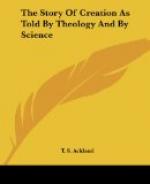“And God said, ‘Let light be’ and light was.
“And God saw the light that it was good, and God divided the light from the darkness.
“And God called the light Day, and the darkness He called Night.
“And there was evening and there was morning, one day.”
The first clause seems to belong rather to the period of action than to the precedent indefinite period of chaos, and may therefore be taken as marking the transition from the “beginning” to the first day, better than as belonging to that beginning itself. The Jewish interpretation of the clause is untenable in the light of the doctrine of the Correlation of the Physical Forces. Till force was evolved there could be neither air nor motion, and so no wind. The words of course bear on their face an assertion of the action of the eternal Spirit in the work of Creation; but when we examine the position which they occupy, it seems highly probable that they have beyond this a much more definite signification. In them a sort of localized action is ascribed to the Spirit—a something very different from the idea conveyed by the often-repeated phrase, “And God said.” What that something may be it is hard for us to conceive, harder still to express, but the following considerations may perhaps throw some glimmering of light upon the matter:—
1. There must be some point in which the Creator comes into contact, as it were, with His creature—a point at which His Will first clothes itself in the form of a physical fact—the point to which all second causes lead up, and at which they lose themselves in the one first cause, the Will of God. Now this is what all systems of philosophy require as their starting-point, but it is entirely out of their unaided reach. But these words supply that indispensable desideratum.
2. These words come in immediate connexion with the evolution of light. Light is throughout the Bible intimately connected with the Deity. It is His chosen emblem. “God is light.” It is His abode. “He dwelleth in the light inaccessible.” It is the symbol of His presence, and the means by which Creation is quickened. “In Him was life; and the life was the light of men.”
3. Light, as we now know, is only one form of the force by which the universe is upheld. But the phenomena of light lead us to infer the existence of what we call Ether, which is supposed to be a perfectly elastic fluid, imponderable, and in fact exempt from almost all the conditions to which matter, as we know it, is subject, except that possibly it offers resistance to bodies moving in it. [Footnote: Encke’s comet shows signs of retardation, as if moving in a resisting medium; but it is possible that that resistance may not arise from the ether, but from the nebulous envelope of the sun.] This fluid must pervade the whole universe, since it brings to us the light of the most distant star or nebula. As it is the medium through which light is conveyed, and as light is now known to be identified with force of all kinds, it seems by no means improbable that it is the medium through which all force acts.




